Food Security: Challenges and Alternatives for GCC Countries
VerifiedAdded on 2023/01/11
|14
|3715
|62
AI Summary
This article discusses the challenges faced by GCC countries in ensuring food security and explores effective alternatives to mitigate these challenges. It examines the impact of food miles, economic limitations, health limitations, and ethical limitations. The article also highlights the efforts of GCC countries in increasing local production and reducing food wastage to enhance food security.
Contribute Materials
Your contribution can guide someone’s learning journey. Share your
documents today.
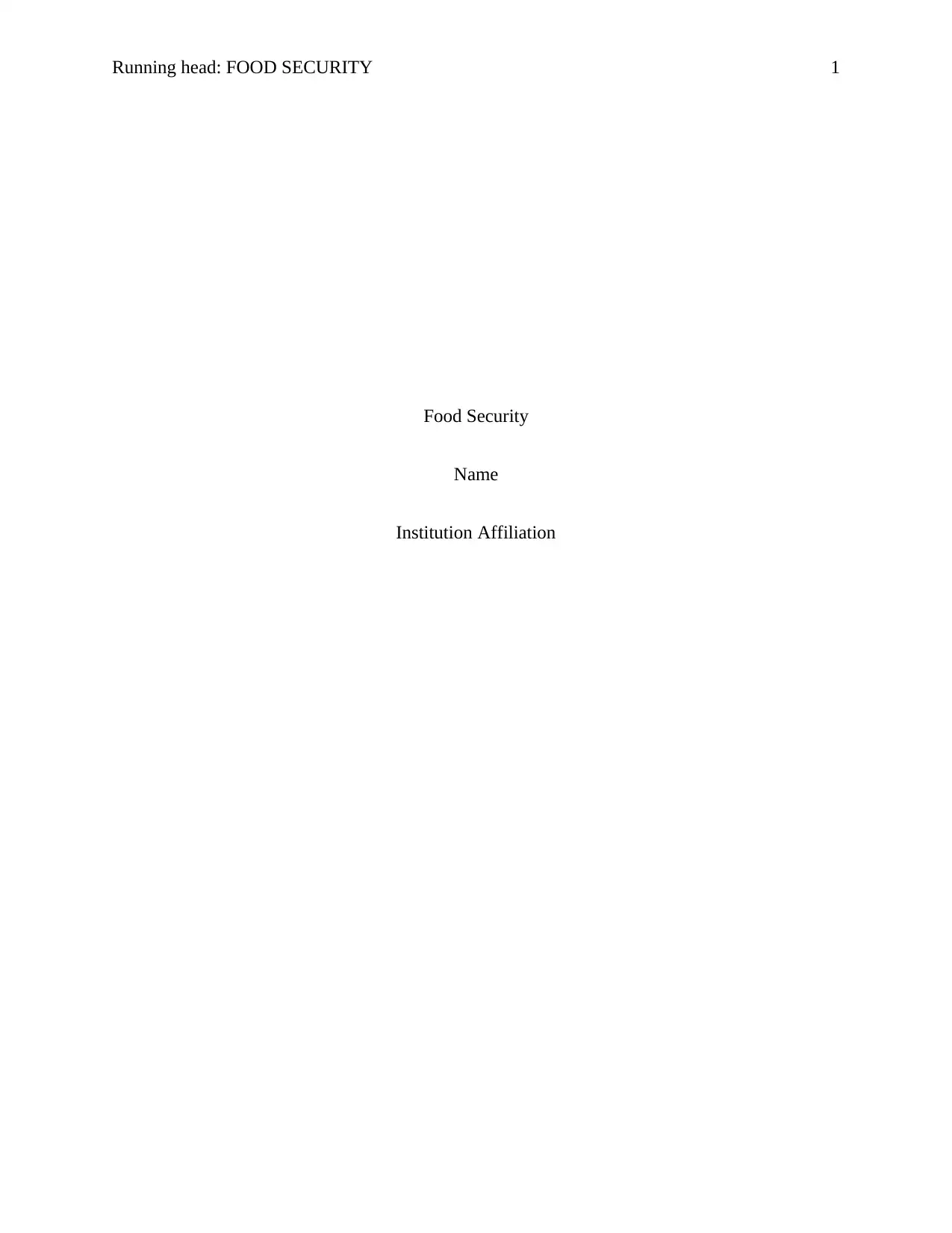
Running head: FOOD SECURITY 1
Food Security
Name
Institution Affiliation
Food Security
Name
Institution Affiliation
Secure Best Marks with AI Grader
Need help grading? Try our AI Grader for instant feedback on your assignments.
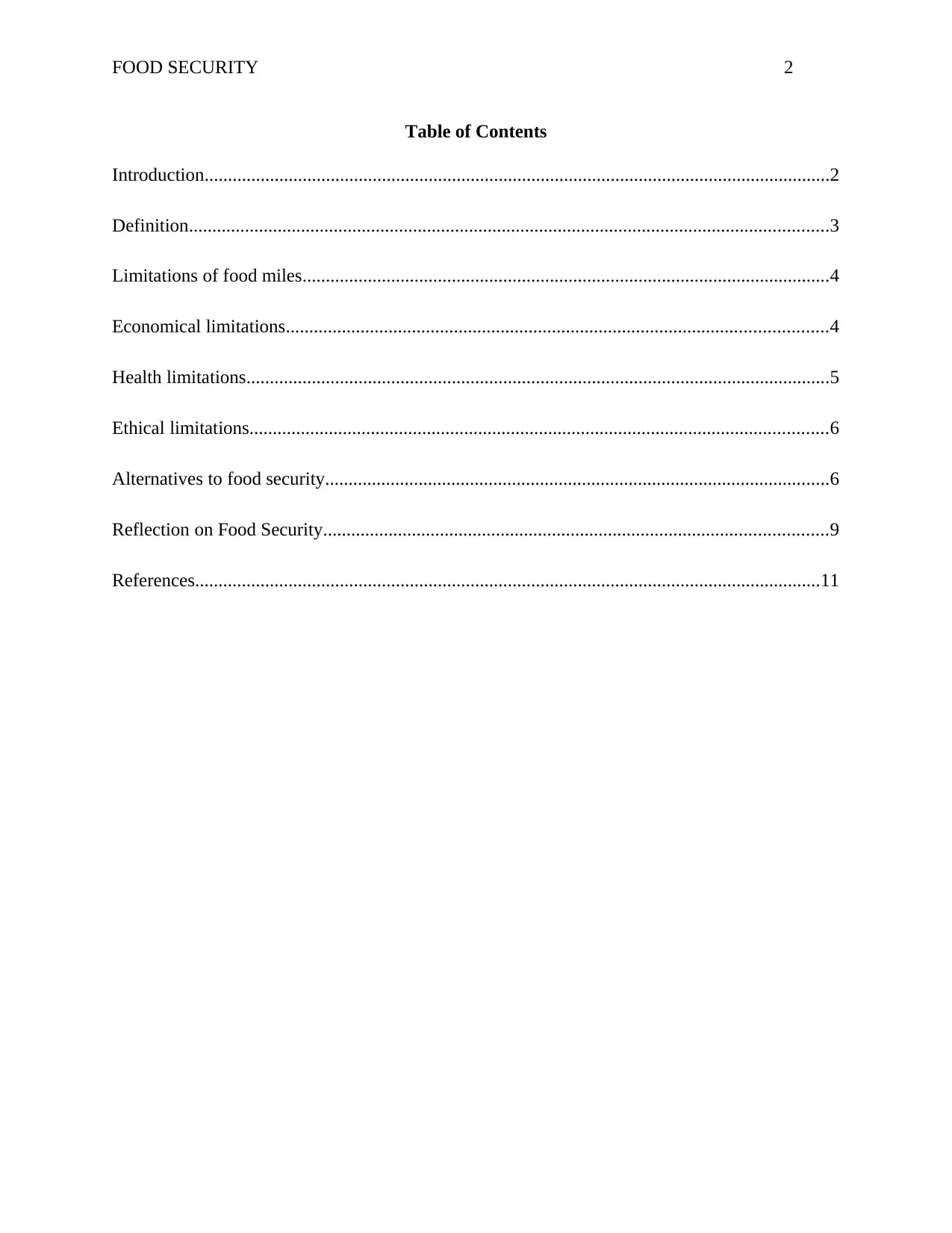
FOOD SECURITY 2
Table of Contents
Introduction......................................................................................................................................2
Definition.........................................................................................................................................3
Limitations of food miles.................................................................................................................4
Economical limitations....................................................................................................................4
Health limitations.............................................................................................................................5
Ethical limitations............................................................................................................................6
Alternatives to food security............................................................................................................6
Reflection on Food Security............................................................................................................9
References......................................................................................................................................11
Table of Contents
Introduction......................................................................................................................................2
Definition.........................................................................................................................................3
Limitations of food miles.................................................................................................................4
Economical limitations....................................................................................................................4
Health limitations.............................................................................................................................5
Ethical limitations............................................................................................................................6
Alternatives to food security............................................................................................................6
Reflection on Food Security............................................................................................................9
References......................................................................................................................................11
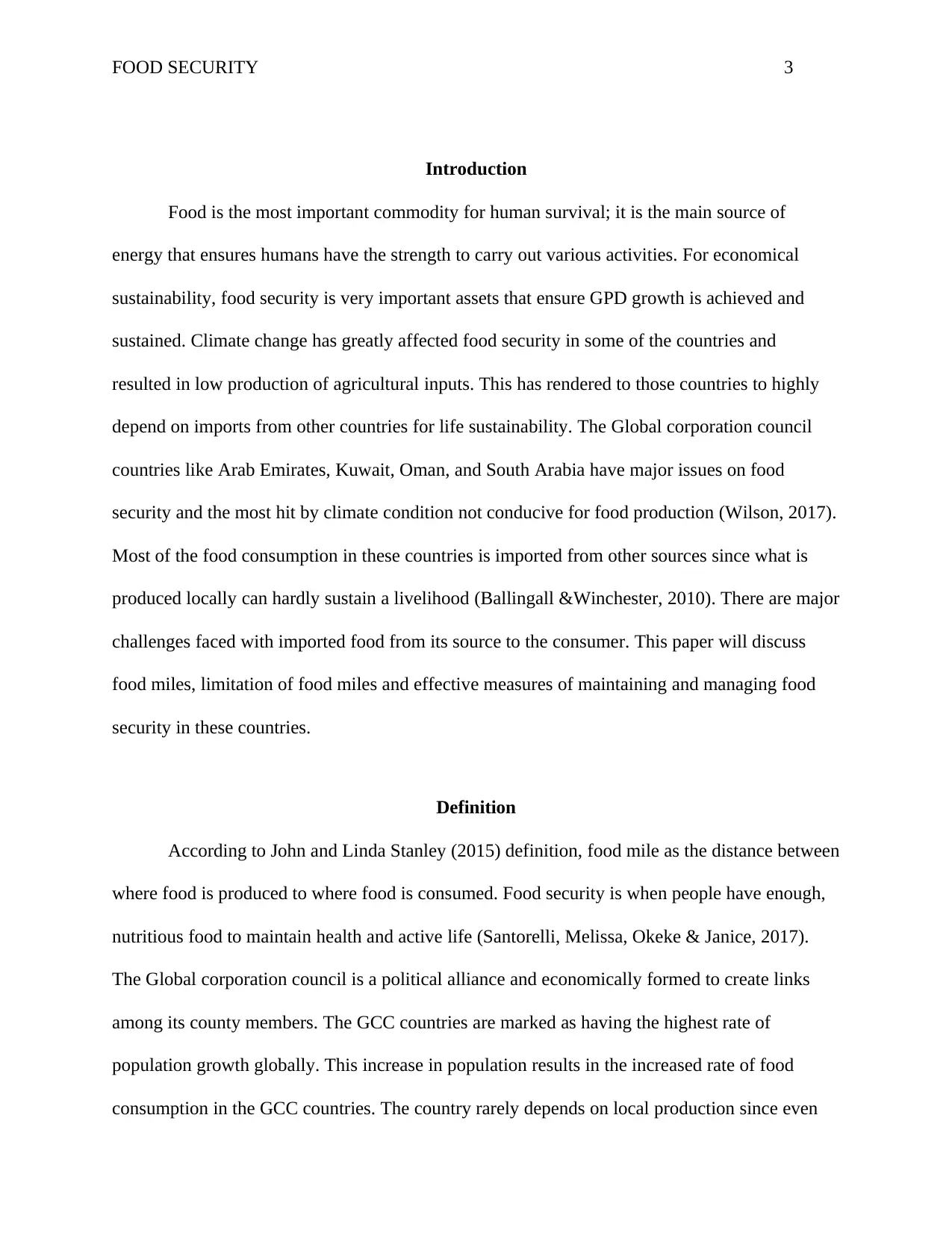
FOOD SECURITY 3
Introduction
Food is the most important commodity for human survival; it is the main source of
energy that ensures humans have the strength to carry out various activities. For economical
sustainability, food security is very important assets that ensure GPD growth is achieved and
sustained. Climate change has greatly affected food security in some of the countries and
resulted in low production of agricultural inputs. This has rendered to those countries to highly
depend on imports from other countries for life sustainability. The Global corporation council
countries like Arab Emirates, Kuwait, Oman, and South Arabia have major issues on food
security and the most hit by climate condition not conducive for food production (Wilson, 2017).
Most of the food consumption in these countries is imported from other sources since what is
produced locally can hardly sustain a livelihood (Ballingall &Winchester, 2010). There are major
challenges faced with imported food from its source to the consumer. This paper will discuss
food miles, limitation of food miles and effective measures of maintaining and managing food
security in these countries.
Definition
According to John and Linda Stanley (2015) definition, food mile as the distance between
where food is produced to where food is consumed. Food security is when people have enough,
nutritious food to maintain health and active life (Santorelli, Melissa, Okeke & Janice, 2017).
The Global corporation council is a political alliance and economically formed to create links
among its county members. The GCC countries are marked as having the highest rate of
population growth globally. This increase in population results in the increased rate of food
consumption in the GCC countries. The country rarely depends on local production since even
Introduction
Food is the most important commodity for human survival; it is the main source of
energy that ensures humans have the strength to carry out various activities. For economical
sustainability, food security is very important assets that ensure GPD growth is achieved and
sustained. Climate change has greatly affected food security in some of the countries and
resulted in low production of agricultural inputs. This has rendered to those countries to highly
depend on imports from other countries for life sustainability. The Global corporation council
countries like Arab Emirates, Kuwait, Oman, and South Arabia have major issues on food
security and the most hit by climate condition not conducive for food production (Wilson, 2017).
Most of the food consumption in these countries is imported from other sources since what is
produced locally can hardly sustain a livelihood (Ballingall &Winchester, 2010). There are major
challenges faced with imported food from its source to the consumer. This paper will discuss
food miles, limitation of food miles and effective measures of maintaining and managing food
security in these countries.
Definition
According to John and Linda Stanley (2015) definition, food mile as the distance between
where food is produced to where food is consumed. Food security is when people have enough,
nutritious food to maintain health and active life (Santorelli, Melissa, Okeke & Janice, 2017).
The Global corporation council is a political alliance and economically formed to create links
among its county members. The GCC countries are marked as having the highest rate of
population growth globally. This increase in population results in the increased rate of food
consumption in the GCC countries. The country rarely depends on local production since even
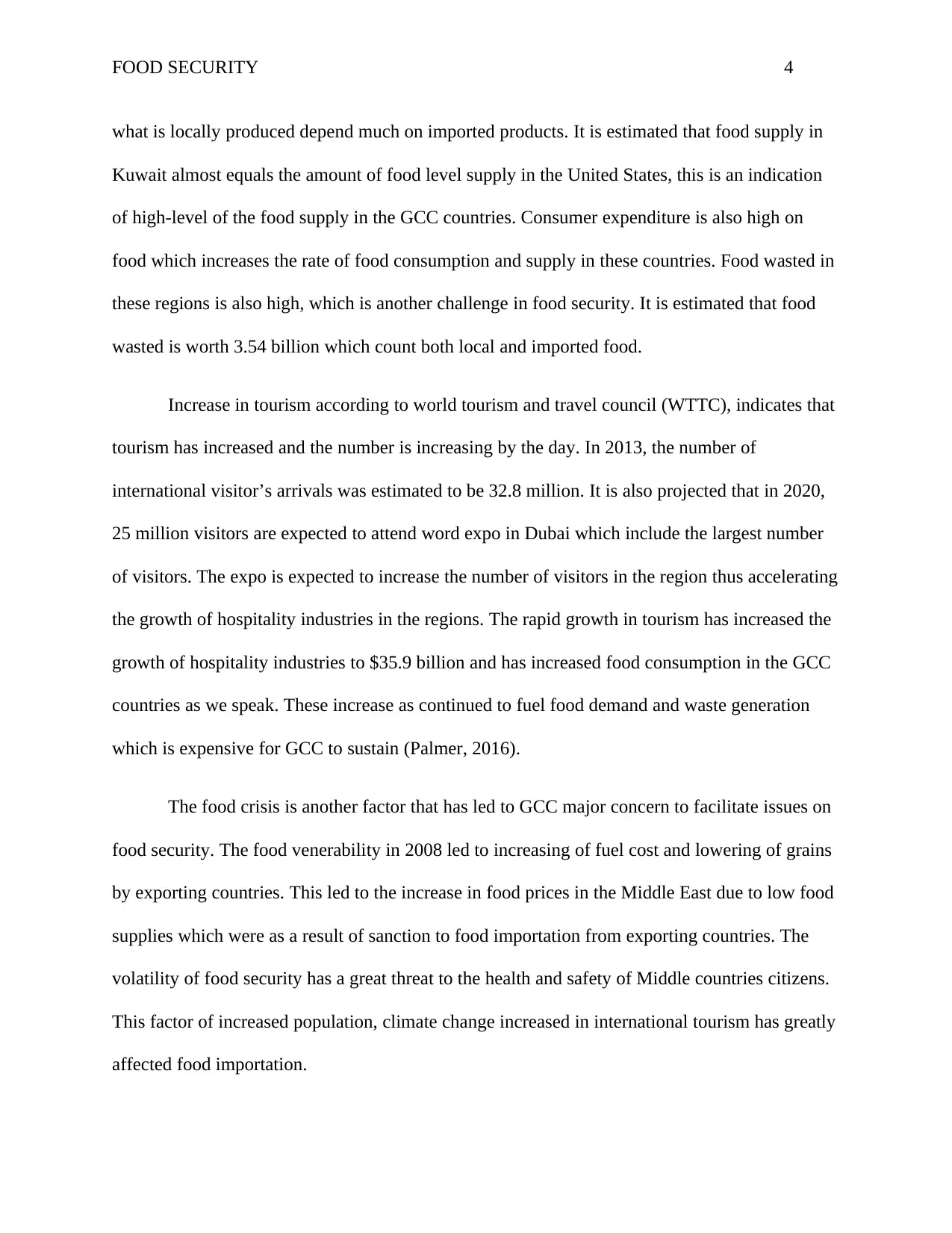
FOOD SECURITY 4
what is locally produced depend much on imported products. It is estimated that food supply in
Kuwait almost equals the amount of food level supply in the United States, this is an indication
of high-level of the food supply in the GCC countries. Consumer expenditure is also high on
food which increases the rate of food consumption and supply in these countries. Food wasted in
these regions is also high, which is another challenge in food security. It is estimated that food
wasted is worth 3.54 billion which count both local and imported food.
Increase in tourism according to world tourism and travel council (WTTC), indicates that
tourism has increased and the number is increasing by the day. In 2013, the number of
international visitor’s arrivals was estimated to be 32.8 million. It is also projected that in 2020,
25 million visitors are expected to attend word expo in Dubai which include the largest number
of visitors. The expo is expected to increase the number of visitors in the region thus accelerating
the growth of hospitality industries in the regions. The rapid growth in tourism has increased the
growth of hospitality industries to $35.9 billion and has increased food consumption in the GCC
countries as we speak. These increase as continued to fuel food demand and waste generation
which is expensive for GCC to sustain (Palmer, 2016).
The food crisis is another factor that has led to GCC major concern to facilitate issues on
food security. The food venerability in 2008 led to increasing of fuel cost and lowering of grains
by exporting countries. This led to the increase in food prices in the Middle East due to low food
supplies which were as a result of sanction to food importation from exporting countries. The
volatility of food security has a great threat to the health and safety of Middle countries citizens.
This factor of increased population, climate change increased in international tourism has greatly
affected food importation.
what is locally produced depend much on imported products. It is estimated that food supply in
Kuwait almost equals the amount of food level supply in the United States, this is an indication
of high-level of the food supply in the GCC countries. Consumer expenditure is also high on
food which increases the rate of food consumption and supply in these countries. Food wasted in
these regions is also high, which is another challenge in food security. It is estimated that food
wasted is worth 3.54 billion which count both local and imported food.
Increase in tourism according to world tourism and travel council (WTTC), indicates that
tourism has increased and the number is increasing by the day. In 2013, the number of
international visitor’s arrivals was estimated to be 32.8 million. It is also projected that in 2020,
25 million visitors are expected to attend word expo in Dubai which include the largest number
of visitors. The expo is expected to increase the number of visitors in the region thus accelerating
the growth of hospitality industries in the regions. The rapid growth in tourism has increased the
growth of hospitality industries to $35.9 billion and has increased food consumption in the GCC
countries as we speak. These increase as continued to fuel food demand and waste generation
which is expensive for GCC to sustain (Palmer, 2016).
The food crisis is another factor that has led to GCC major concern to facilitate issues on
food security. The food venerability in 2008 led to increasing of fuel cost and lowering of grains
by exporting countries. This led to the increase in food prices in the Middle East due to low food
supplies which were as a result of sanction to food importation from exporting countries. The
volatility of food security has a great threat to the health and safety of Middle countries citizens.
This factor of increased population, climate change increased in international tourism has greatly
affected food importation.
Paraphrase This Document
Need a fresh take? Get an instant paraphrase of this document with our AI Paraphraser
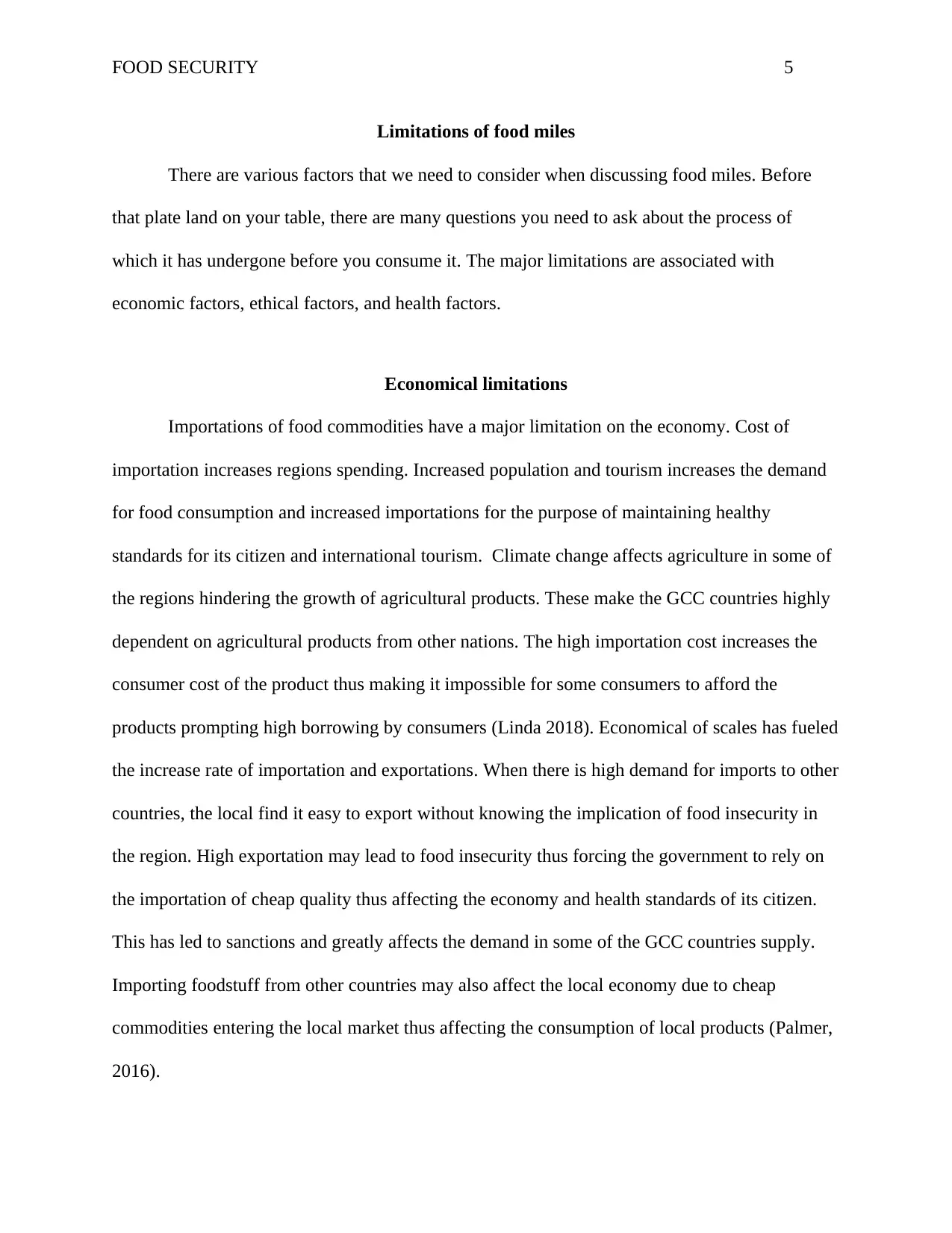
FOOD SECURITY 5
Limitations of food miles
There are various factors that we need to consider when discussing food miles. Before
that plate land on your table, there are many questions you need to ask about the process of
which it has undergone before you consume it. The major limitations are associated with
economic factors, ethical factors, and health factors.
Economical limitations
Importations of food commodities have a major limitation on the economy. Cost of
importation increases regions spending. Increased population and tourism increases the demand
for food consumption and increased importations for the purpose of maintaining healthy
standards for its citizen and international tourism. Climate change affects agriculture in some of
the regions hindering the growth of agricultural products. These make the GCC countries highly
dependent on agricultural products from other nations. The high importation cost increases the
consumer cost of the product thus making it impossible for some consumers to afford the
products prompting high borrowing by consumers (Linda 2018). Economical of scales has fueled
the increase rate of importation and exportations. When there is high demand for imports to other
countries, the local find it easy to export without knowing the implication of food insecurity in
the region. High exportation may lead to food insecurity thus forcing the government to rely on
the importation of cheap quality thus affecting the economy and health standards of its citizen.
This has led to sanctions and greatly affects the demand in some of the GCC countries supply.
Importing foodstuff from other countries may also affect the local economy due to cheap
commodities entering the local market thus affecting the consumption of local products (Palmer,
2016).
Limitations of food miles
There are various factors that we need to consider when discussing food miles. Before
that plate land on your table, there are many questions you need to ask about the process of
which it has undergone before you consume it. The major limitations are associated with
economic factors, ethical factors, and health factors.
Economical limitations
Importations of food commodities have a major limitation on the economy. Cost of
importation increases regions spending. Increased population and tourism increases the demand
for food consumption and increased importations for the purpose of maintaining healthy
standards for its citizen and international tourism. Climate change affects agriculture in some of
the regions hindering the growth of agricultural products. These make the GCC countries highly
dependent on agricultural products from other nations. The high importation cost increases the
consumer cost of the product thus making it impossible for some consumers to afford the
products prompting high borrowing by consumers (Linda 2018). Economical of scales has fueled
the increase rate of importation and exportations. When there is high demand for imports to other
countries, the local find it easy to export without knowing the implication of food insecurity in
the region. High exportation may lead to food insecurity thus forcing the government to rely on
the importation of cheap quality thus affecting the economy and health standards of its citizen.
This has led to sanctions and greatly affects the demand in some of the GCC countries supply.
Importing foodstuff from other countries may also affect the local economy due to cheap
commodities entering the local market thus affecting the consumption of local products (Palmer,
2016).
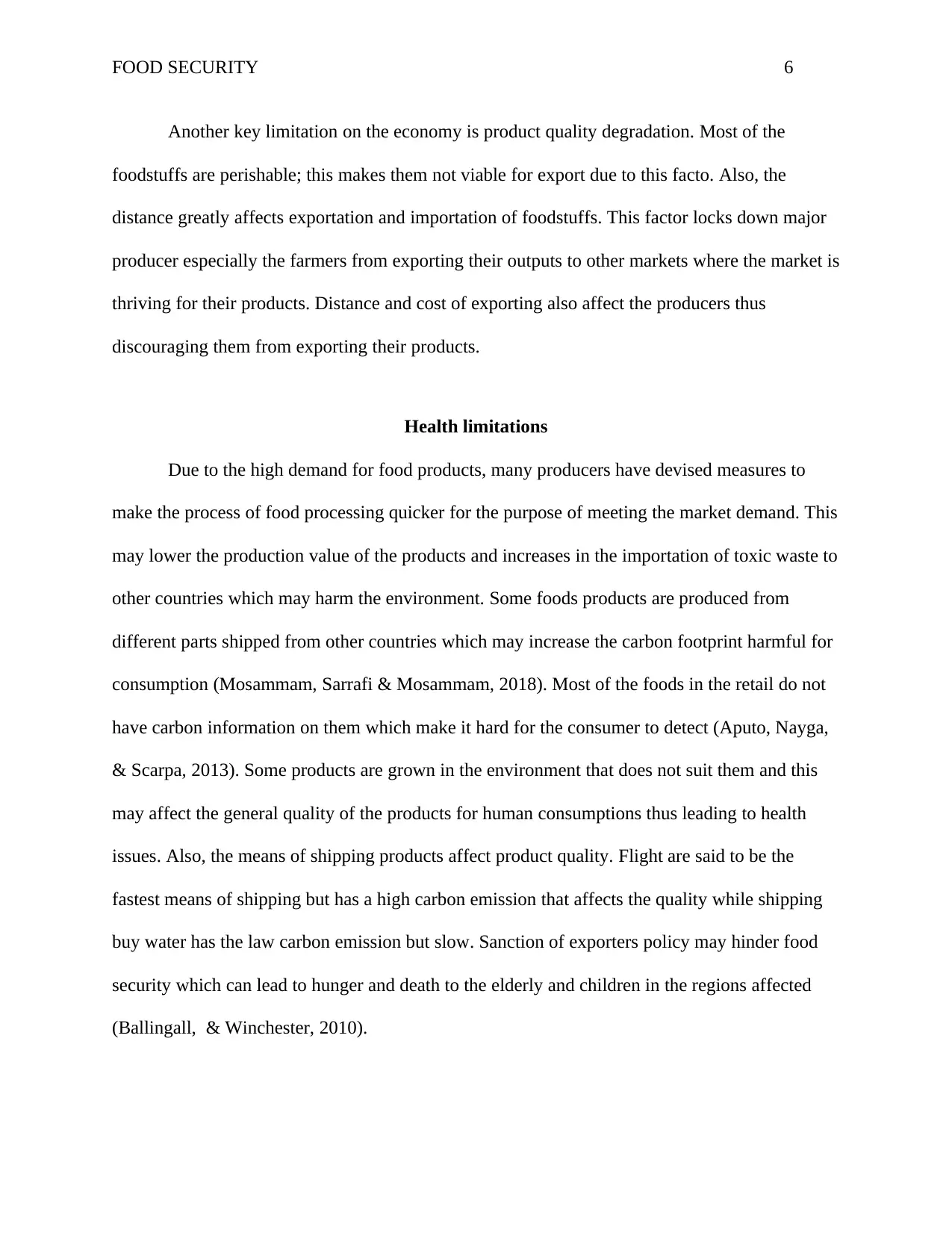
FOOD SECURITY 6
Another key limitation on the economy is product quality degradation. Most of the
foodstuffs are perishable; this makes them not viable for export due to this facto. Also, the
distance greatly affects exportation and importation of foodstuffs. This factor locks down major
producer especially the farmers from exporting their outputs to other markets where the market is
thriving for their products. Distance and cost of exporting also affect the producers thus
discouraging them from exporting their products.
Health limitations
Due to the high demand for food products, many producers have devised measures to
make the process of food processing quicker for the purpose of meeting the market demand. This
may lower the production value of the products and increases in the importation of toxic waste to
other countries which may harm the environment. Some foods products are produced from
different parts shipped from other countries which may increase the carbon footprint harmful for
consumption (Mosammam, Sarrafi & Mosammam, 2018). Most of the foods in the retail do not
have carbon information on them which make it hard for the consumer to detect (Aputo, Nayga,
& Scarpa, 2013). Some products are grown in the environment that does not suit them and this
may affect the general quality of the products for human consumptions thus leading to health
issues. Also, the means of shipping products affect product quality. Flight are said to be the
fastest means of shipping but has a high carbon emission that affects the quality while shipping
buy water has the law carbon emission but slow. Sanction of exporters policy may hinder food
security which can lead to hunger and death to the elderly and children in the regions affected
(Ballingall, & Winchester, 2010).
Another key limitation on the economy is product quality degradation. Most of the
foodstuffs are perishable; this makes them not viable for export due to this facto. Also, the
distance greatly affects exportation and importation of foodstuffs. This factor locks down major
producer especially the farmers from exporting their outputs to other markets where the market is
thriving for their products. Distance and cost of exporting also affect the producers thus
discouraging them from exporting their products.
Health limitations
Due to the high demand for food products, many producers have devised measures to
make the process of food processing quicker for the purpose of meeting the market demand. This
may lower the production value of the products and increases in the importation of toxic waste to
other countries which may harm the environment. Some foods products are produced from
different parts shipped from other countries which may increase the carbon footprint harmful for
consumption (Mosammam, Sarrafi & Mosammam, 2018). Most of the foods in the retail do not
have carbon information on them which make it hard for the consumer to detect (Aputo, Nayga,
& Scarpa, 2013). Some products are grown in the environment that does not suit them and this
may affect the general quality of the products for human consumptions thus leading to health
issues. Also, the means of shipping products affect product quality. Flight are said to be the
fastest means of shipping but has a high carbon emission that affects the quality while shipping
buy water has the law carbon emission but slow. Sanction of exporters policy may hinder food
security which can lead to hunger and death to the elderly and children in the regions affected
(Ballingall, & Winchester, 2010).
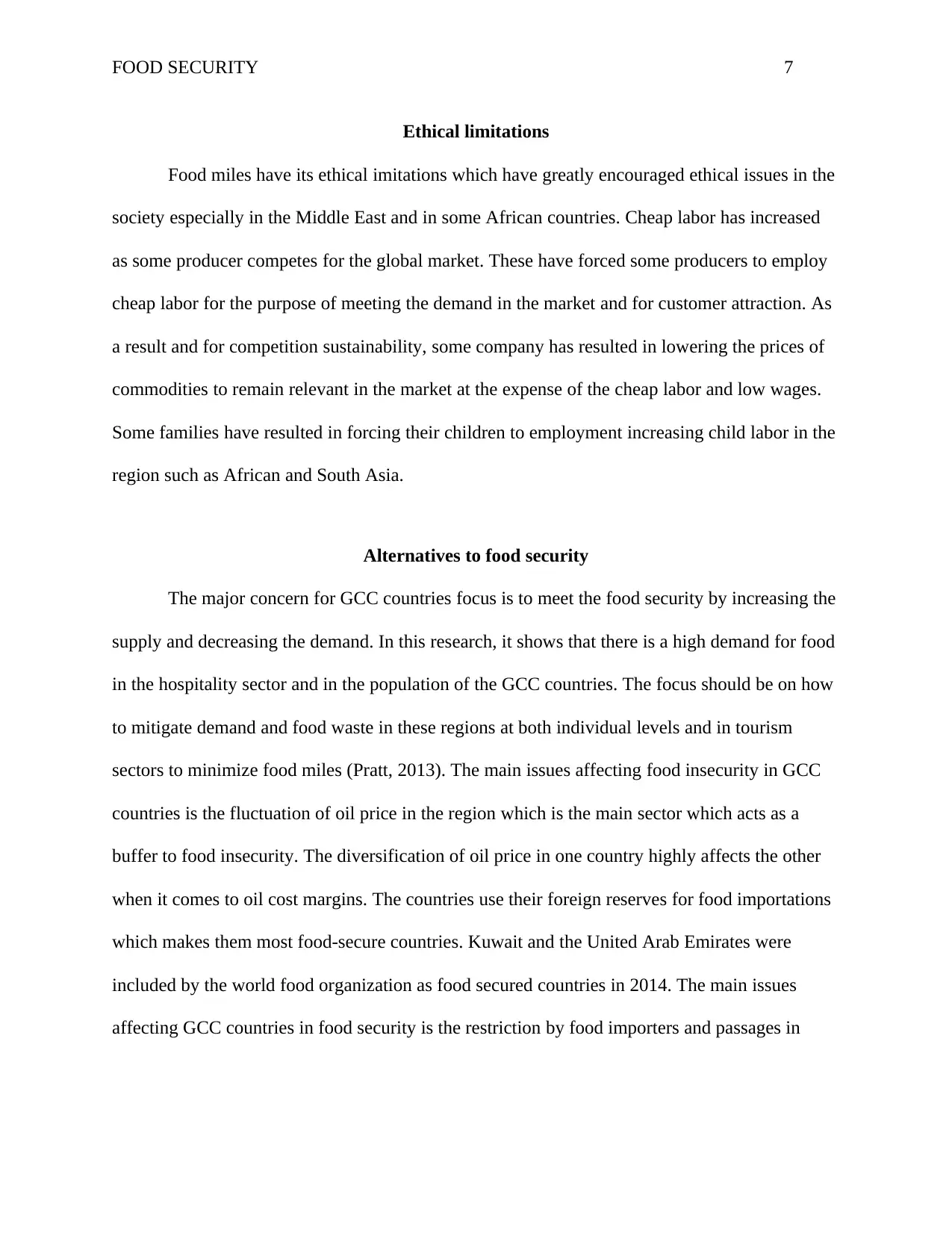
FOOD SECURITY 7
Ethical limitations
Food miles have its ethical imitations which have greatly encouraged ethical issues in the
society especially in the Middle East and in some African countries. Cheap labor has increased
as some producer competes for the global market. These have forced some producers to employ
cheap labor for the purpose of meeting the demand in the market and for customer attraction. As
a result and for competition sustainability, some company has resulted in lowering the prices of
commodities to remain relevant in the market at the expense of the cheap labor and low wages.
Some families have resulted in forcing their children to employment increasing child labor in the
region such as African and South Asia.
Alternatives to food security
The major concern for GCC countries focus is to meet the food security by increasing the
supply and decreasing the demand. In this research, it shows that there is a high demand for food
in the hospitality sector and in the population of the GCC countries. The focus should be on how
to mitigate demand and food waste in these regions at both individual levels and in tourism
sectors to minimize food miles (Pratt, 2013). The main issues affecting food insecurity in GCC
countries is the fluctuation of oil price in the region which is the main sector which acts as a
buffer to food insecurity. The diversification of oil price in one country highly affects the other
when it comes to oil cost margins. The countries use their foreign reserves for food importations
which makes them most food-secure countries. Kuwait and the United Arab Emirates were
included by the world food organization as food secured countries in 2014. The main issues
affecting GCC countries in food security is the restriction by food importers and passages in
Ethical limitations
Food miles have its ethical imitations which have greatly encouraged ethical issues in the
society especially in the Middle East and in some African countries. Cheap labor has increased
as some producer competes for the global market. These have forced some producers to employ
cheap labor for the purpose of meeting the demand in the market and for customer attraction. As
a result and for competition sustainability, some company has resulted in lowering the prices of
commodities to remain relevant in the market at the expense of the cheap labor and low wages.
Some families have resulted in forcing their children to employment increasing child labor in the
region such as African and South Asia.
Alternatives to food security
The major concern for GCC countries focus is to meet the food security by increasing the
supply and decreasing the demand. In this research, it shows that there is a high demand for food
in the hospitality sector and in the population of the GCC countries. The focus should be on how
to mitigate demand and food waste in these regions at both individual levels and in tourism
sectors to minimize food miles (Pratt, 2013). The main issues affecting food insecurity in GCC
countries is the fluctuation of oil price in the region which is the main sector which acts as a
buffer to food insecurity. The diversification of oil price in one country highly affects the other
when it comes to oil cost margins. The countries use their foreign reserves for food importations
which makes them most food-secure countries. Kuwait and the United Arab Emirates were
included by the world food organization as food secured countries in 2014. The main issues
affecting GCC countries in food security is the restriction by food importers and passages in
Secure Best Marks with AI Grader
Need help grading? Try our AI Grader for instant feedback on your assignments.
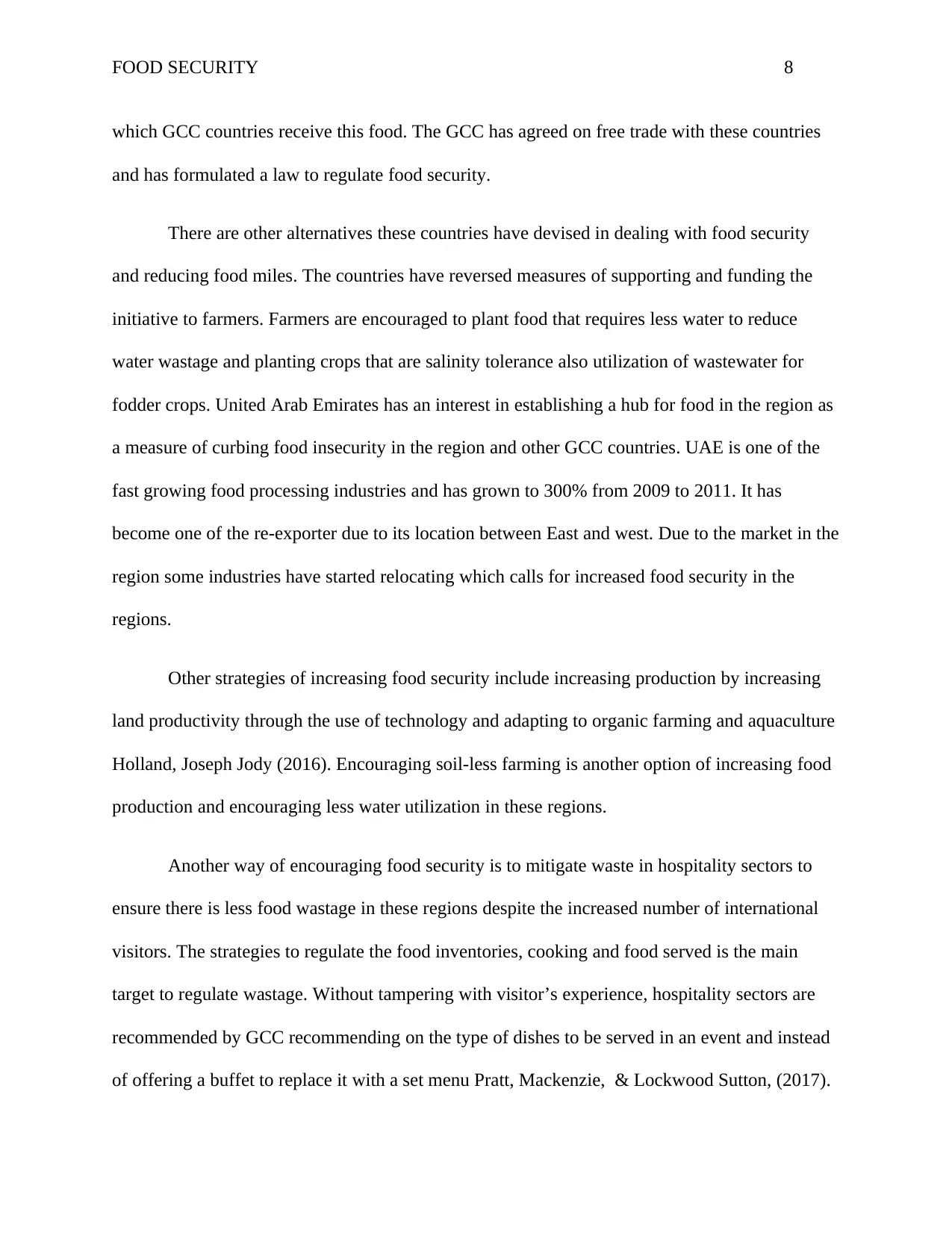
FOOD SECURITY 8
which GCC countries receive this food. The GCC has agreed on free trade with these countries
and has formulated a law to regulate food security.
There are other alternatives these countries have devised in dealing with food security
and reducing food miles. The countries have reversed measures of supporting and funding the
initiative to farmers. Farmers are encouraged to plant food that requires less water to reduce
water wastage and planting crops that are salinity tolerance also utilization of wastewater for
fodder crops. United Arab Emirates has an interest in establishing a hub for food in the region as
a measure of curbing food insecurity in the region and other GCC countries. UAE is one of the
fast growing food processing industries and has grown to 300% from 2009 to 2011. It has
become one of the re-exporter due to its location between East and west. Due to the market in the
region some industries have started relocating which calls for increased food security in the
regions.
Other strategies of increasing food security include increasing production by increasing
land productivity through the use of technology and adapting to organic farming and aquaculture
Holland, Joseph Jody (2016). Encouraging soil-less farming is another option of increasing food
production and encouraging less water utilization in these regions.
Another way of encouraging food security is to mitigate waste in hospitality sectors to
ensure there is less food wastage in these regions despite the increased number of international
visitors. The strategies to regulate the food inventories, cooking and food served is the main
target to regulate wastage. Without tampering with visitor’s experience, hospitality sectors are
recommended by GCC recommending on the type of dishes to be served in an event and instead
of offering a buffet to replace it with a set menu Pratt, Mackenzie, & Lockwood Sutton, (2017).
which GCC countries receive this food. The GCC has agreed on free trade with these countries
and has formulated a law to regulate food security.
There are other alternatives these countries have devised in dealing with food security
and reducing food miles. The countries have reversed measures of supporting and funding the
initiative to farmers. Farmers are encouraged to plant food that requires less water to reduce
water wastage and planting crops that are salinity tolerance also utilization of wastewater for
fodder crops. United Arab Emirates has an interest in establishing a hub for food in the region as
a measure of curbing food insecurity in the region and other GCC countries. UAE is one of the
fast growing food processing industries and has grown to 300% from 2009 to 2011. It has
become one of the re-exporter due to its location between East and west. Due to the market in the
region some industries have started relocating which calls for increased food security in the
regions.
Other strategies of increasing food security include increasing production by increasing
land productivity through the use of technology and adapting to organic farming and aquaculture
Holland, Joseph Jody (2016). Encouraging soil-less farming is another option of increasing food
production and encouraging less water utilization in these regions.
Another way of encouraging food security is to mitigate waste in hospitality sectors to
ensure there is less food wastage in these regions despite the increased number of international
visitors. The strategies to regulate the food inventories, cooking and food served is the main
target to regulate wastage. Without tampering with visitor’s experience, hospitality sectors are
recommended by GCC recommending on the type of dishes to be served in an event and instead
of offering a buffet to replace it with a set menu Pratt, Mackenzie, & Lockwood Sutton, (2017).
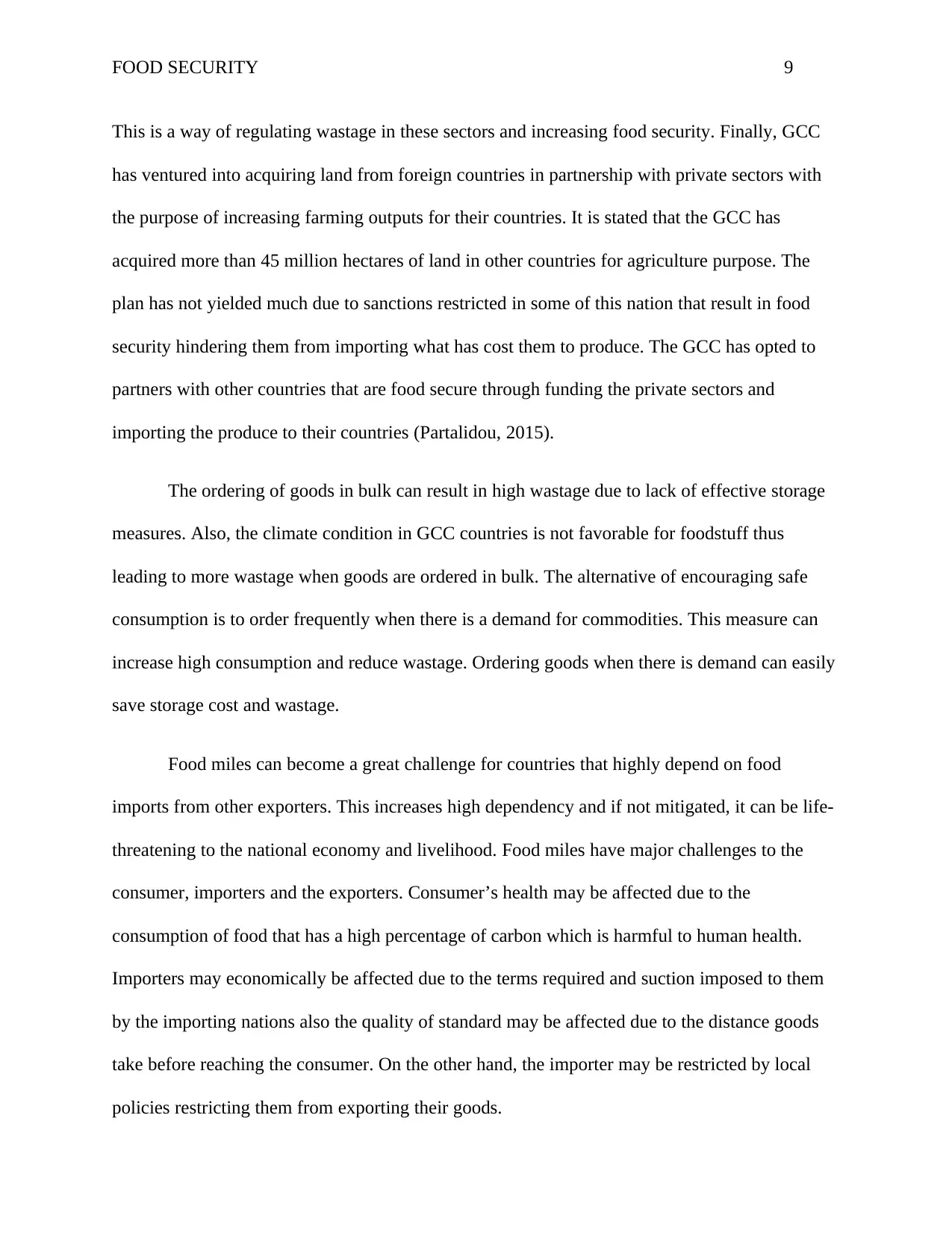
FOOD SECURITY 9
This is a way of regulating wastage in these sectors and increasing food security. Finally, GCC
has ventured into acquiring land from foreign countries in partnership with private sectors with
the purpose of increasing farming outputs for their countries. It is stated that the GCC has
acquired more than 45 million hectares of land in other countries for agriculture purpose. The
plan has not yielded much due to sanctions restricted in some of this nation that result in food
security hindering them from importing what has cost them to produce. The GCC has opted to
partners with other countries that are food secure through funding the private sectors and
importing the produce to their countries (Partalidou, 2015).
The ordering of goods in bulk can result in high wastage due to lack of effective storage
measures. Also, the climate condition in GCC countries is not favorable for foodstuff thus
leading to more wastage when goods are ordered in bulk. The alternative of encouraging safe
consumption is to order frequently when there is a demand for commodities. This measure can
increase high consumption and reduce wastage. Ordering goods when there is demand can easily
save storage cost and wastage.
Food miles can become a great challenge for countries that highly depend on food
imports from other exporters. This increases high dependency and if not mitigated, it can be life-
threatening to the national economy and livelihood. Food miles have major challenges to the
consumer, importers and the exporters. Consumer’s health may be affected due to the
consumption of food that has a high percentage of carbon which is harmful to human health.
Importers may economically be affected due to the terms required and suction imposed to them
by the importing nations also the quality of standard may be affected due to the distance goods
take before reaching the consumer. On the other hand, the importer may be restricted by local
policies restricting them from exporting their goods.
This is a way of regulating wastage in these sectors and increasing food security. Finally, GCC
has ventured into acquiring land from foreign countries in partnership with private sectors with
the purpose of increasing farming outputs for their countries. It is stated that the GCC has
acquired more than 45 million hectares of land in other countries for agriculture purpose. The
plan has not yielded much due to sanctions restricted in some of this nation that result in food
security hindering them from importing what has cost them to produce. The GCC has opted to
partners with other countries that are food secure through funding the private sectors and
importing the produce to their countries (Partalidou, 2015).
The ordering of goods in bulk can result in high wastage due to lack of effective storage
measures. Also, the climate condition in GCC countries is not favorable for foodstuff thus
leading to more wastage when goods are ordered in bulk. The alternative of encouraging safe
consumption is to order frequently when there is a demand for commodities. This measure can
increase high consumption and reduce wastage. Ordering goods when there is demand can easily
save storage cost and wastage.
Food miles can become a great challenge for countries that highly depend on food
imports from other exporters. This increases high dependency and if not mitigated, it can be life-
threatening to the national economy and livelihood. Food miles have major challenges to the
consumer, importers and the exporters. Consumer’s health may be affected due to the
consumption of food that has a high percentage of carbon which is harmful to human health.
Importers may economically be affected due to the terms required and suction imposed to them
by the importing nations also the quality of standard may be affected due to the distance goods
take before reaching the consumer. On the other hand, the importer may be restricted by local
policies restricting them from exporting their goods.
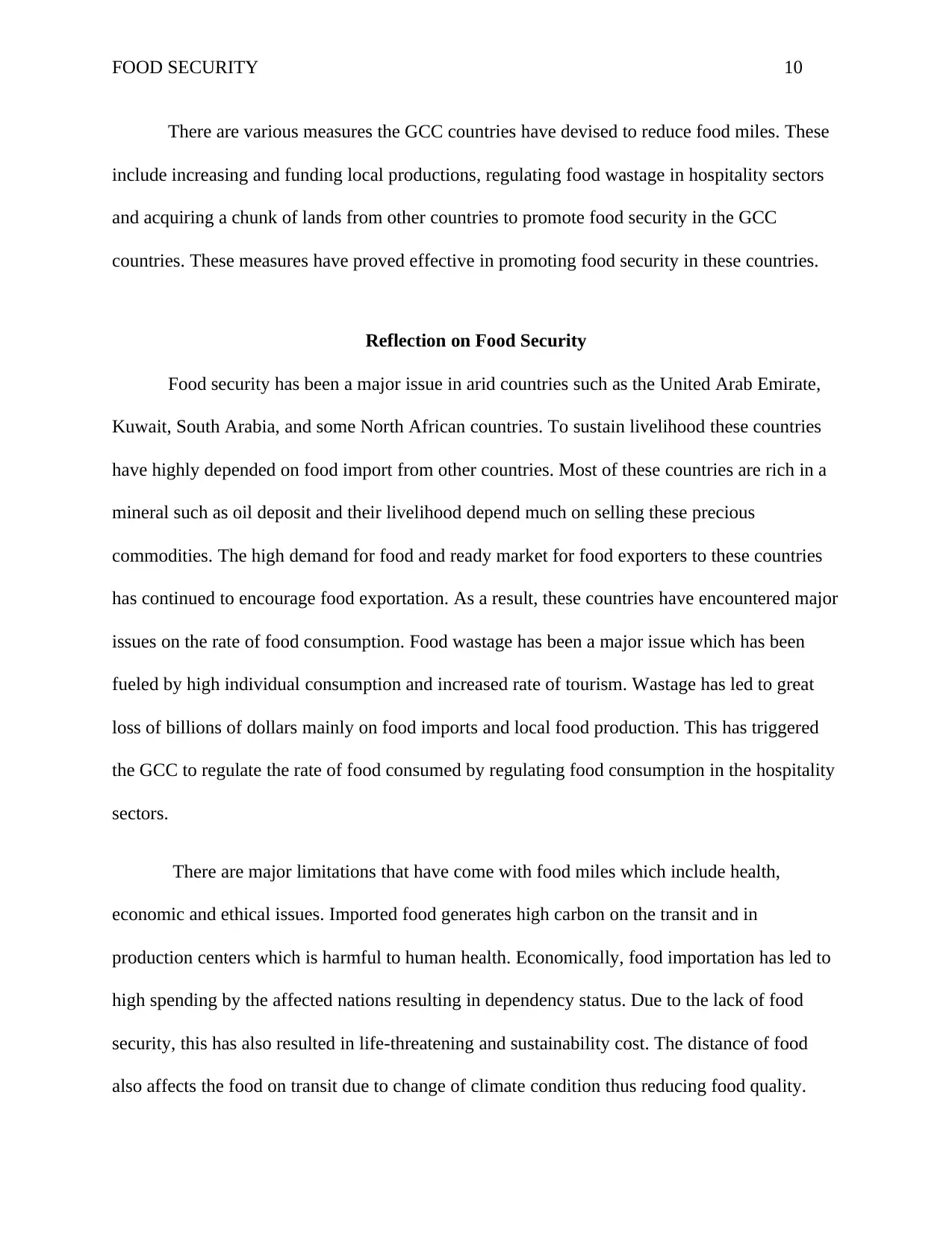
FOOD SECURITY 10
There are various measures the GCC countries have devised to reduce food miles. These
include increasing and funding local productions, regulating food wastage in hospitality sectors
and acquiring a chunk of lands from other countries to promote food security in the GCC
countries. These measures have proved effective in promoting food security in these countries.
Reflection on Food Security
Food security has been a major issue in arid countries such as the United Arab Emirate,
Kuwait, South Arabia, and some North African countries. To sustain livelihood these countries
have highly depended on food import from other countries. Most of these countries are rich in a
mineral such as oil deposit and their livelihood depend much on selling these precious
commodities. The high demand for food and ready market for food exporters to these countries
has continued to encourage food exportation. As a result, these countries have encountered major
issues on the rate of food consumption. Food wastage has been a major issue which has been
fueled by high individual consumption and increased rate of tourism. Wastage has led to great
loss of billions of dollars mainly on food imports and local food production. This has triggered
the GCC to regulate the rate of food consumed by regulating food consumption in the hospitality
sectors.
There are major limitations that have come with food miles which include health,
economic and ethical issues. Imported food generates high carbon on the transit and in
production centers which is harmful to human health. Economically, food importation has led to
high spending by the affected nations resulting in dependency status. Due to the lack of food
security, this has also resulted in life-threatening and sustainability cost. The distance of food
also affects the food on transit due to change of climate condition thus reducing food quality.
There are various measures the GCC countries have devised to reduce food miles. These
include increasing and funding local productions, regulating food wastage in hospitality sectors
and acquiring a chunk of lands from other countries to promote food security in the GCC
countries. These measures have proved effective in promoting food security in these countries.
Reflection on Food Security
Food security has been a major issue in arid countries such as the United Arab Emirate,
Kuwait, South Arabia, and some North African countries. To sustain livelihood these countries
have highly depended on food import from other countries. Most of these countries are rich in a
mineral such as oil deposit and their livelihood depend much on selling these precious
commodities. The high demand for food and ready market for food exporters to these countries
has continued to encourage food exportation. As a result, these countries have encountered major
issues on the rate of food consumption. Food wastage has been a major issue which has been
fueled by high individual consumption and increased rate of tourism. Wastage has led to great
loss of billions of dollars mainly on food imports and local food production. This has triggered
the GCC to regulate the rate of food consumed by regulating food consumption in the hospitality
sectors.
There are major limitations that have come with food miles which include health,
economic and ethical issues. Imported food generates high carbon on the transit and in
production centers which is harmful to human health. Economically, food importation has led to
high spending by the affected nations resulting in dependency status. Due to the lack of food
security, this has also resulted in life-threatening and sustainability cost. The distance of food
also affects the food on transit due to change of climate condition thus reducing food quality.
Paraphrase This Document
Need a fresh take? Get an instant paraphrase of this document with our AI Paraphraser
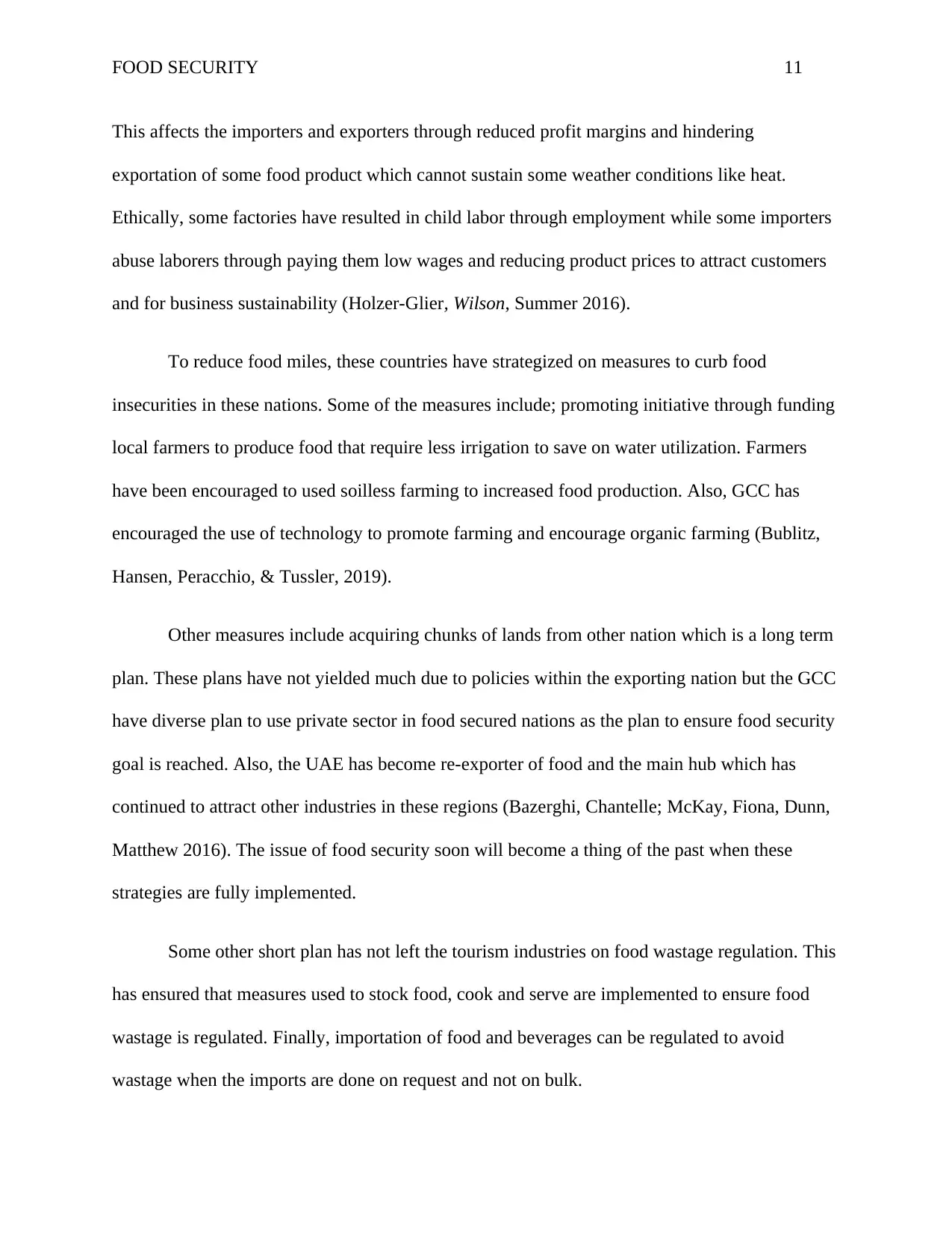
FOOD SECURITY 11
This affects the importers and exporters through reduced profit margins and hindering
exportation of some food product which cannot sustain some weather conditions like heat.
Ethically, some factories have resulted in child labor through employment while some importers
abuse laborers through paying them low wages and reducing product prices to attract customers
and for business sustainability (Holzer-Glier, Wilson, Summer 2016).
To reduce food miles, these countries have strategized on measures to curb food
insecurities in these nations. Some of the measures include; promoting initiative through funding
local farmers to produce food that require less irrigation to save on water utilization. Farmers
have been encouraged to used soilless farming to increased food production. Also, GCC has
encouraged the use of technology to promote farming and encourage organic farming (Bublitz,
Hansen, Peracchio, & Tussler, 2019).
Other measures include acquiring chunks of lands from other nation which is a long term
plan. These plans have not yielded much due to policies within the exporting nation but the GCC
have diverse plan to use private sector in food secured nations as the plan to ensure food security
goal is reached. Also, the UAE has become re-exporter of food and the main hub which has
continued to attract other industries in these regions (Bazerghi, Chantelle; McKay, Fiona, Dunn,
Matthew 2016). The issue of food security soon will become a thing of the past when these
strategies are fully implemented.
Some other short plan has not left the tourism industries on food wastage regulation. This
has ensured that measures used to stock food, cook and serve are implemented to ensure food
wastage is regulated. Finally, importation of food and beverages can be regulated to avoid
wastage when the imports are done on request and not on bulk.
This affects the importers and exporters through reduced profit margins and hindering
exportation of some food product which cannot sustain some weather conditions like heat.
Ethically, some factories have resulted in child labor through employment while some importers
abuse laborers through paying them low wages and reducing product prices to attract customers
and for business sustainability (Holzer-Glier, Wilson, Summer 2016).
To reduce food miles, these countries have strategized on measures to curb food
insecurities in these nations. Some of the measures include; promoting initiative through funding
local farmers to produce food that require less irrigation to save on water utilization. Farmers
have been encouraged to used soilless farming to increased food production. Also, GCC has
encouraged the use of technology to promote farming and encourage organic farming (Bublitz,
Hansen, Peracchio, & Tussler, 2019).
Other measures include acquiring chunks of lands from other nation which is a long term
plan. These plans have not yielded much due to policies within the exporting nation but the GCC
have diverse plan to use private sector in food secured nations as the plan to ensure food security
goal is reached. Also, the UAE has become re-exporter of food and the main hub which has
continued to attract other industries in these regions (Bazerghi, Chantelle; McKay, Fiona, Dunn,
Matthew 2016). The issue of food security soon will become a thing of the past when these
strategies are fully implemented.
Some other short plan has not left the tourism industries on food wastage regulation. This
has ensured that measures used to stock food, cook and serve are implemented to ensure food
wastage is regulated. Finally, importation of food and beverages can be regulated to avoid
wastage when the imports are done on request and not on bulk.
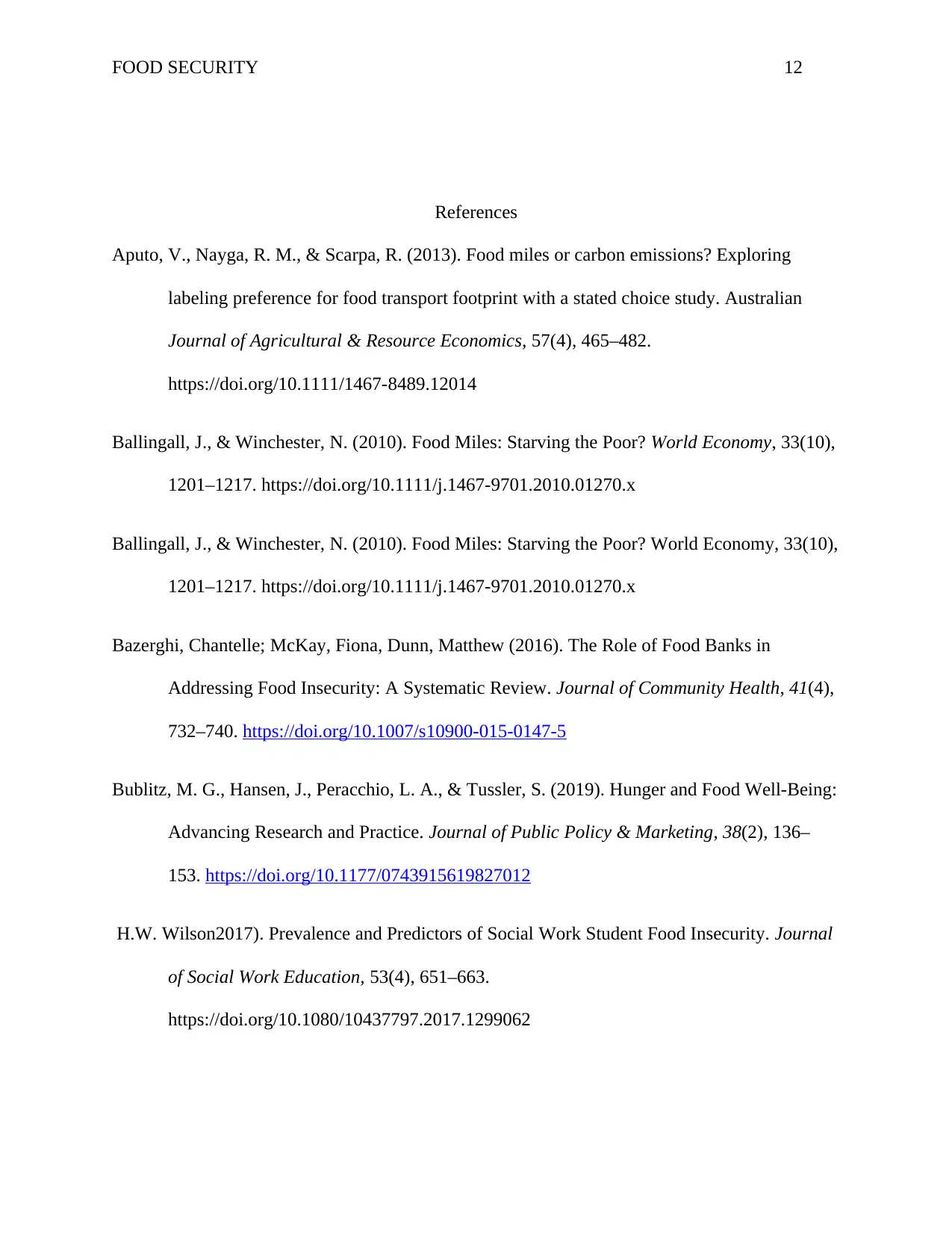
FOOD SECURITY 12
References
Aputo, V., Nayga, R. M., & Scarpa, R. (2013). Food miles or carbon emissions? Exploring
labeling preference for food transport footprint with a stated choice study. Australian
Journal of Agricultural & Resource Economics, 57(4), 465–482.
https://doi.org/10.1111/1467-8489.12014
Ballingall, J., & Winchester, N. (2010). Food Miles: Starving the Poor? World Economy, 33(10),
1201–1217. https://doi.org/10.1111/j.1467-9701.2010.01270.x
Ballingall, J., & Winchester, N. (2010). Food Miles: Starving the Poor? World Economy, 33(10),
1201–1217. https://doi.org/10.1111/j.1467-9701.2010.01270.x
Bazerghi, Chantelle; McKay, Fiona, Dunn, Matthew (2016). The Role of Food Banks in
Addressing Food Insecurity: A Systematic Review. Journal of Community Health, 41(4),
732–740. https://doi.org/10.1007/s10900-015-0147-5
Bublitz, M. G., Hansen, J., Peracchio, L. A., & Tussler, S. (2019). Hunger and Food Well-Being:
Advancing Research and Practice. Journal of Public Policy & Marketing, 38(2), 136–
153. https://doi.org/10.1177/0743915619827012
H.W. Wilson2017). Prevalence and Predictors of Social Work Student Food Insecurity. Journal
of Social Work Education, 53(4), 651–663.
https://doi.org/10.1080/10437797.2017.1299062
References
Aputo, V., Nayga, R. M., & Scarpa, R. (2013). Food miles or carbon emissions? Exploring
labeling preference for food transport footprint with a stated choice study. Australian
Journal of Agricultural & Resource Economics, 57(4), 465–482.
https://doi.org/10.1111/1467-8489.12014
Ballingall, J., & Winchester, N. (2010). Food Miles: Starving the Poor? World Economy, 33(10),
1201–1217. https://doi.org/10.1111/j.1467-9701.2010.01270.x
Ballingall, J., & Winchester, N. (2010). Food Miles: Starving the Poor? World Economy, 33(10),
1201–1217. https://doi.org/10.1111/j.1467-9701.2010.01270.x
Bazerghi, Chantelle; McKay, Fiona, Dunn, Matthew (2016). The Role of Food Banks in
Addressing Food Insecurity: A Systematic Review. Journal of Community Health, 41(4),
732–740. https://doi.org/10.1007/s10900-015-0147-5
Bublitz, M. G., Hansen, J., Peracchio, L. A., & Tussler, S. (2019). Hunger and Food Well-Being:
Advancing Research and Practice. Journal of Public Policy & Marketing, 38(2), 136–
153. https://doi.org/10.1177/0743915619827012
H.W. Wilson2017). Prevalence and Predictors of Social Work Student Food Insecurity. Journal
of Social Work Education, 53(4), 651–663.
https://doi.org/10.1080/10437797.2017.1299062
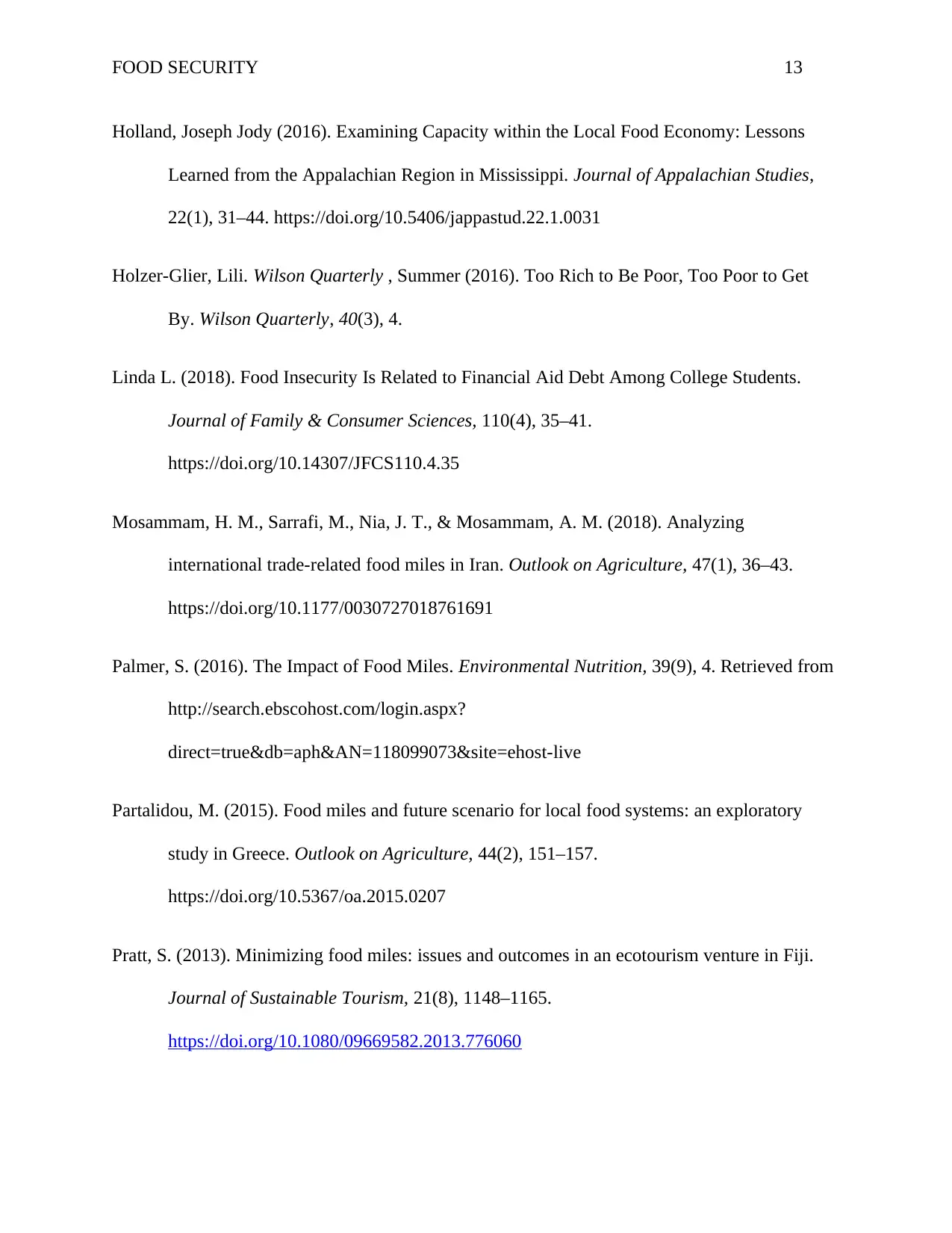
FOOD SECURITY 13
Holland, Joseph Jody (2016). Examining Capacity within the Local Food Economy: Lessons
Learned from the Appalachian Region in Mississippi. Journal of Appalachian Studies,
22(1), 31–44. https://doi.org/10.5406/jappastud.22.1.0031
Holzer-Glier, Lili. Wilson Quarterly , Summer (2016). Too Rich to Be Poor, Too Poor to Get
By. Wilson Quarterly, 40(3), 4.
Linda L. (2018). Food Insecurity Is Related to Financial Aid Debt Among College Students.
Journal of Family & Consumer Sciences, 110(4), 35–41.
https://doi.org/10.14307/JFCS110.4.35
Mosammam, H. M., Sarrafi, M., Nia, J. T., & Mosammam, A. M. (2018). Analyzing
international trade-related food miles in Iran. Outlook on Agriculture, 47(1), 36–43.
https://doi.org/10.1177/0030727018761691
Palmer, S. (2016). The Impact of Food Miles. Environmental Nutrition, 39(9), 4. Retrieved from
http://search.ebscohost.com/login.aspx?
direct=true&db=aph&AN=118099073&site=ehost-live
Partalidou, M. (2015). Food miles and future scenario for local food systems: an exploratory
study in Greece. Outlook on Agriculture, 44(2), 151–157.
https://doi.org/10.5367/oa.2015.0207
Pratt, S. (2013). Minimizing food miles: issues and outcomes in an ecotourism venture in Fiji.
Journal of Sustainable Tourism, 21(8), 1148–1165.
https://doi.org/10.1080/09669582.2013.776060
Holland, Joseph Jody (2016). Examining Capacity within the Local Food Economy: Lessons
Learned from the Appalachian Region in Mississippi. Journal of Appalachian Studies,
22(1), 31–44. https://doi.org/10.5406/jappastud.22.1.0031
Holzer-Glier, Lili. Wilson Quarterly , Summer (2016). Too Rich to Be Poor, Too Poor to Get
By. Wilson Quarterly, 40(3), 4.
Linda L. (2018). Food Insecurity Is Related to Financial Aid Debt Among College Students.
Journal of Family & Consumer Sciences, 110(4), 35–41.
https://doi.org/10.14307/JFCS110.4.35
Mosammam, H. M., Sarrafi, M., Nia, J. T., & Mosammam, A. M. (2018). Analyzing
international trade-related food miles in Iran. Outlook on Agriculture, 47(1), 36–43.
https://doi.org/10.1177/0030727018761691
Palmer, S. (2016). The Impact of Food Miles. Environmental Nutrition, 39(9), 4. Retrieved from
http://search.ebscohost.com/login.aspx?
direct=true&db=aph&AN=118099073&site=ehost-live
Partalidou, M. (2015). Food miles and future scenario for local food systems: an exploratory
study in Greece. Outlook on Agriculture, 44(2), 151–157.
https://doi.org/10.5367/oa.2015.0207
Pratt, S. (2013). Minimizing food miles: issues and outcomes in an ecotourism venture in Fiji.
Journal of Sustainable Tourism, 21(8), 1148–1165.
https://doi.org/10.1080/09669582.2013.776060
Secure Best Marks with AI Grader
Need help grading? Try our AI Grader for instant feedback on your assignments.
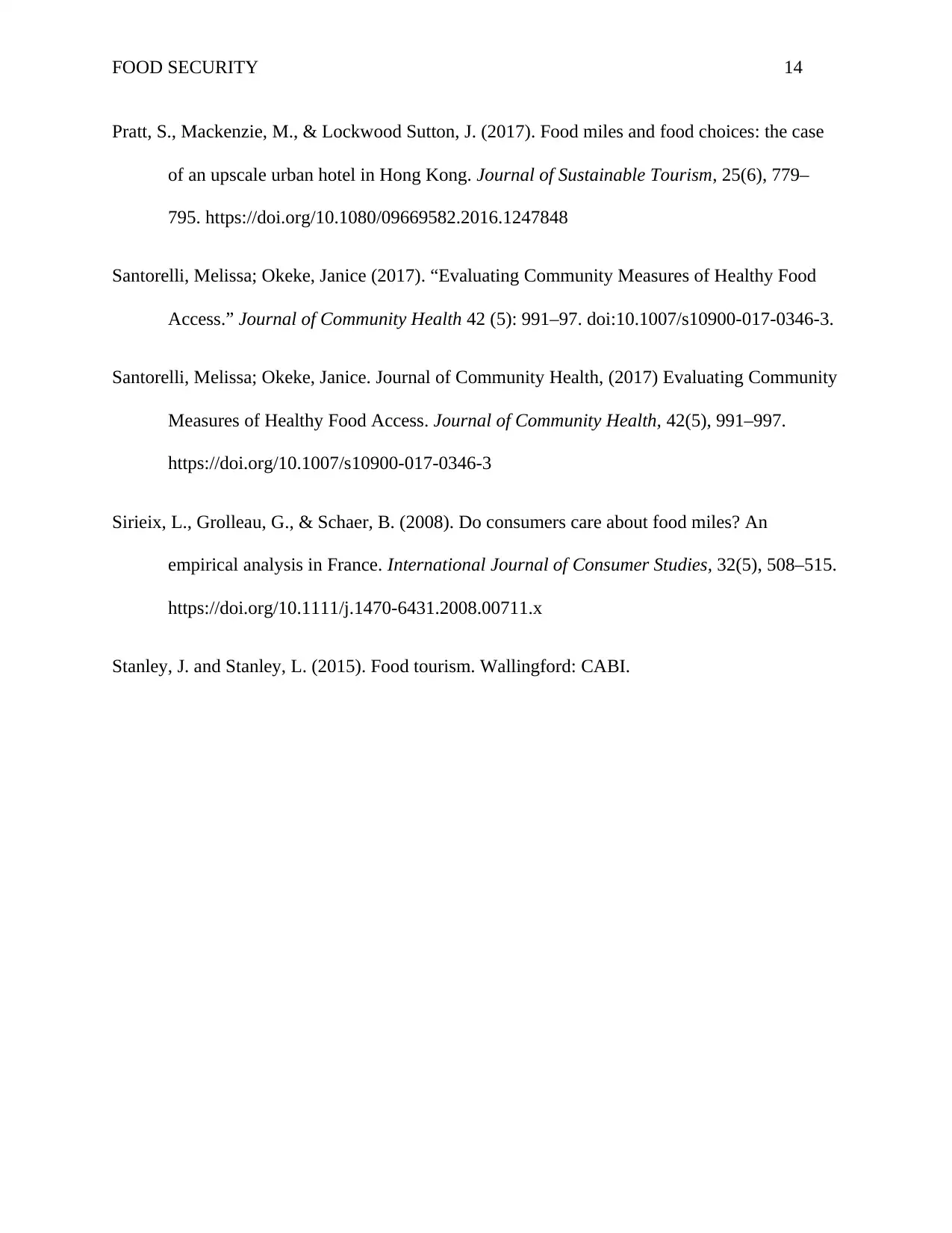
FOOD SECURITY 14
Pratt, S., Mackenzie, M., & Lockwood Sutton, J. (2017). Food miles and food choices: the case
of an upscale urban hotel in Hong Kong. Journal of Sustainable Tourism, 25(6), 779–
795. https://doi.org/10.1080/09669582.2016.1247848
Santorelli, Melissa; Okeke, Janice (2017). “Evaluating Community Measures of Healthy Food
Access.” Journal of Community Health 42 (5): 991–97. doi:10.1007/s10900-017-0346-3.
Santorelli, Melissa; Okeke, Janice. Journal of Community Health, (2017) Evaluating Community
Measures of Healthy Food Access. Journal of Community Health, 42(5), 991–997.
https://doi.org/10.1007/s10900-017-0346-3
Sirieix, L., Grolleau, G., & Schaer, B. (2008). Do consumers care about food miles? An
empirical analysis in France. International Journal of Consumer Studies, 32(5), 508–515.
https://doi.org/10.1111/j.1470-6431.2008.00711.x
Stanley, J. and Stanley, L. (2015). Food tourism. Wallingford: CABI.
Pratt, S., Mackenzie, M., & Lockwood Sutton, J. (2017). Food miles and food choices: the case
of an upscale urban hotel in Hong Kong. Journal of Sustainable Tourism, 25(6), 779–
795. https://doi.org/10.1080/09669582.2016.1247848
Santorelli, Melissa; Okeke, Janice (2017). “Evaluating Community Measures of Healthy Food
Access.” Journal of Community Health 42 (5): 991–97. doi:10.1007/s10900-017-0346-3.
Santorelli, Melissa; Okeke, Janice. Journal of Community Health, (2017) Evaluating Community
Measures of Healthy Food Access. Journal of Community Health, 42(5), 991–997.
https://doi.org/10.1007/s10900-017-0346-3
Sirieix, L., Grolleau, G., & Schaer, B. (2008). Do consumers care about food miles? An
empirical analysis in France. International Journal of Consumer Studies, 32(5), 508–515.
https://doi.org/10.1111/j.1470-6431.2008.00711.x
Stanley, J. and Stanley, L. (2015). Food tourism. Wallingford: CABI.
1 out of 14
![[object Object]](/_next/static/media/star-bottom.7253800d.svg)





